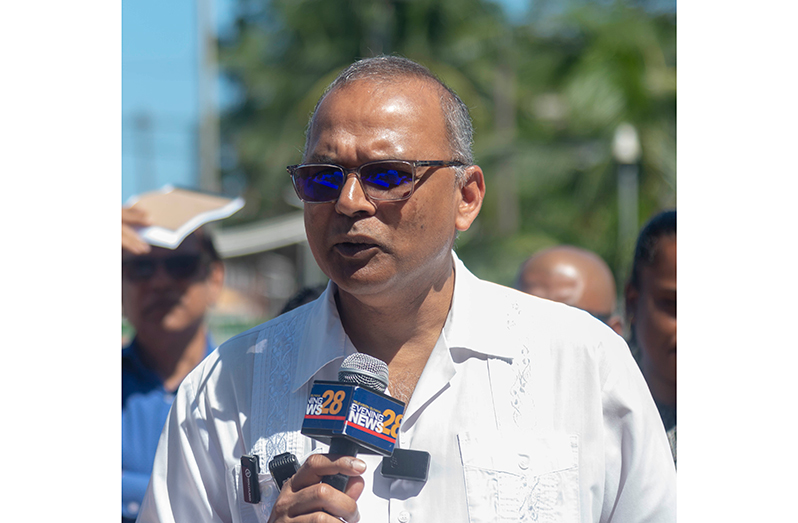-as it ramps up efforts to reduce spread of vector-borne diseases
THE Minister of Health Dr. Frank Anthony, on Friday morning handed over vector control equipment and supplies to the tune of $646M as part of ongoing efforts to prevent the spread of vector borne diseases.
The handing-over ceremony was held at the ministry’s Brickdam, Georgetown office and saw regional health officers (RHOs) and representatives of the Neighbourhood Democratic Councils (NDCs) in the 10 administrative regions receiving the equipment and supplies.
Health Minister Dr Frank Anthony in remarks prior to the handing over, told the gathering that it is indeed a significant morning for them since one of the ministry’s biggest challenges is the control of vector-borne infections across Guyana.
Some of the equipment that will be used to fight vector-borne diseases across Guyana
He reported that they have been placing a lot of emphasis on the diseases transmitted by mosquitoes.
The minister explained that if they attack the vector, which is the mosquito, then they can reduce the spread of diseases such as dengue, malaria, and chikungunya.
“So, once we attack the vector, we will be able to control many of these diseases,” he said adding that countries in South America are experiencing a surge in vector- borne diseases.
“In Brazil for example, there have been millions of cases of dengue and you had lots of persons being admitted and of course, you had deaths. When you look at the wave across South America, you saw in 2023 and 2024 and of course, you will continue to see that the experts talked about climate change. You will see more of these vectors coming into being and transmitting more types of these infections,” he said.
The minister stated that Guyana recorded 8,000 cases of dengue in 2023. In 2024, that figure went up with 11,000 cases being diagnosed and for this year, there has been 62 cases confirmed cases this far.
“We want to reduce the incidence of dengue, malaria and other vector borne diseases in Guyana and we believe that one way of doing this is to interrupt the cycle. What you see before you here are ways of how we can interrupt that cycle by killing the mosquito, killing the vector, killing the transmission,” the minister said.
Dr Anthony pointed out that there have been discussions with the technical staff and what was being displayed represents a $646M investment in spraying machines and large fogging machines mounted on vehicles, as well as the hand-held version of those equipment.
The minister assured the attendees that persons using the equipment will be properly attired with protective gear. He informed the gathering that the mist that will be sprayed from the machines contain harmful chemicals and given the danger, masks will be used.

Noting that the goal is to interrupt the mosquito cycle both at the adult stage and at the larva stage, the minister said that according to the guidelines that are in place, protective gear must be worn whenever the spraying and fogging equipment are in use.
Dr Anthony pointed out that the staff have been trained and they will in turn train the representatives of the NDCs and municipalities in the 10 regions.
The minister disclosed that they have made available test kits in all the regions to test for vector-borne diseases and at the national level they have a referral laboratory equipped to do more advanced testing with the ability to do sequencing to assist in molecular surveillance.
“The quality of what we are able to do now are improving significantly and with this major investment we are now making in terms of diseases’ elimination, I think this will take us one step closer to controlling many of the mosquito-borne infections,” he said.
Also delivering remarks was Dr Vishwa Mahadeo, Director General Regional Health Services, Ministry of Health, who reported that the handing over is a direct approach by the minister, who has responded to a challenge by providing the equipment and supplies to tackle vector-borne diseases in the country.
“You will be held accountable for the proper use and care of the equipment, since it wasn’t ‘chicken feed’ money spent to acquire it,” he said.
Meanwhile, Dr Riza Niles-Robin, Director of Vector Control Services, Ministry of Health, said that the activity was an overall step towards reducing the burden of vector-borne diseases in Guyana.
She said that the tools being handed over represented a substantial commitment of the administration and the Ministry of Health to improving the collective efforts to prevent the spread of vector-borne diseases.
“Today, we are cementing the impact, in [the] hope of reducing the diseases and ultimately contributing to the disease-elimination plan which the minister has spearheaded within the country through the Ministry of Health,” she said.
Dr Cerdel McWatt, the Region Nine RHO, said vector control has played a pivotal role in the regions and he is grateful for the additional equipment and supplies
“We urge that the various departments use it to decrease the incidents [sic] of diseases,” he said.
Author :
Publish date : 2025-01-10 20:35:00
Copyright for syndicated content belongs to the linked Source.
—-
Author : theamericannews
Publish date : 2025-01-11 11:52:51
Copyright for syndicated content belongs to the linked Source.